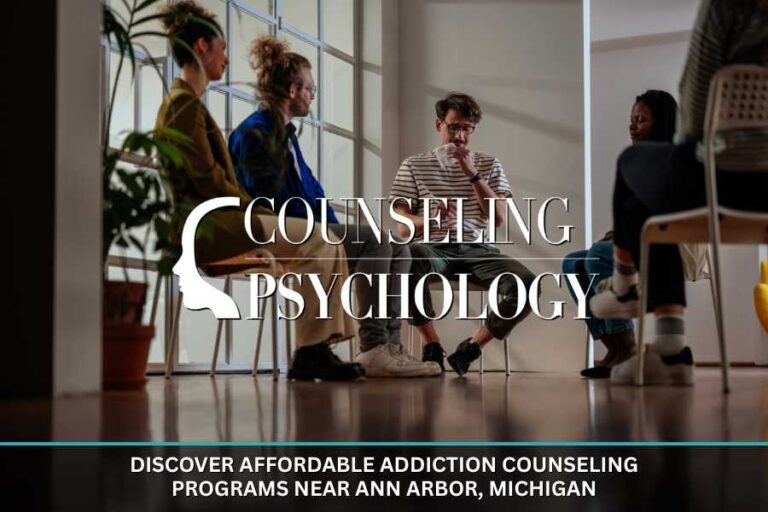Compare Affordable Addiction Counseling Programs Near Ann Arbor, Michigan

Addiction counseling has become an increasingly important profession in Michigan, where communities continue to respond to the ongoing opioid crisis and other substance use challenges. In Ann Arbor, a city recognized for its strong healthcare network and focus on public wellness, aspiring counselors can find affordable training options that prepare them for licensure and real world practice (Michigan Department of Health and Human Services).
According to Centers for Disease Control and Prevention data, Michigan has reported thousands of opioid related overdose deaths over the last decade, underscoring the urgent need for skilled professionals who can provide evidence based support to individuals and families. For those considering this path, comparing program structures, costs, and career outcomes can help identify the most practical and effective route forward. Expanded program opportunities, particularly those that balance affordability with rigorous training, offer a pathway to entering the field quickly while also ensuring long term career readiness.
2026 Discover Affordable Addiction Counseling Programs Near Ann Arbor, MI
University of Detroit Mercy
Detroit, MI - Private 4-year - udmercy.edu
Master's - Master of Arts with a major in Addiction Counseling
Campus Based - Visit Website
University of Detroit Mercy's Master of Arts in Addiction Counseling offers an exceptional, comprehensive program designed to train future addiction specialists. With a robust 60-credit curriculum spanning three years, students receive intensive preparation in substance and behavioral addiction treatment. The program's affordability is enhanced by its 100% job placement rate and small class sizes, reducing overall educational expenses. Students benefit from practical clinical experiences, including a no-cost counseling clinic training opportunity. The curriculum emphasizes both theoretical knowledge and hands-on intervention strategies, preparing graduates for professional licensure and immediate employment in rehabilitation centers, outpatient clinics, and public agencies. With a strong 10:1 student-to-faculty ratio and faculty holding terminal degrees, students receive personalized, high-quality education.
- 60-credit, three-year program
- 100% job placement rate
- Nationally recognized addiction counseling
- Michigan's premier addiction program
- Practical clinical experience included
- Eligible for professional licensure
- Small class sizes
- 10:1 student to faculty ratio
- 100% faculty terminal degrees
- No-cost counseling clinic training
Addiction Counseling in Ann Arbor: Local Demand and Opportunities
Washtenaw County, where Ann Arbor is located, has invested heavily in substance use prevention and recovery services as part of broader public health initiatives (Washtenaw County Community Mental Health). Community reports highlight a growing emphasis on accessible treatment resources, which has created strong demand for licensed addiction counselors. The county's approach has focused on ensuring that residents can receive timely care, whether through prevention programs, outpatient treatment, or long term recovery support.
Professionals in Ann Arbor frequently work across a range of settings including community health centers, rehabilitation facilities, hospitals, and private practices. Partnerships between local organizations and state agencies expand treatment options and foster innovative approaches to recovery. These collaborations provide graduates with meaningful employment opportunities in diverse environments, while also ensuring that the region continues to build a sustainable workforce of qualified addiction counselors.
Pathways to Becoming a Licensed Addiction Counselor in Michigan
Pursuing an addiction counseling degree program in Michigan typically involves a structured educational and licensure process. The journey often begins with a degree in counseling, psychology, or a closely related field, followed by specialized coursework in substance use disorders. Students are expected to demonstrate knowledge of the biological, psychological, and social factors that contribute to substance misuse, and many programs integrate research based strategies to provide a strong academic foundation.
Michigan's licensure pathways include the Certified Advanced Alcohol and Drug Counselor (CAADC) and similar credentials that require both classroom learning and supervised practice (Michigan Certification Board for Addiction Professionals). In Ann Arbor, programs frequently include coursework in addiction theory, ethics, assessment, and evidence based treatment models. These are paired with structured field experiences in local clinics and recovery centers, giving students the opportunity to apply classroom learning in real world settings while developing professional competence.
Balancing Affordability With Career Readiness
For many aspiring counselors, affordability is a major factor in selecting a program. In Ann Arbor and nearby areas, cost conscious options may include community programs, flexible hybrid learning formats, and part time study tracks designed to accommodate work schedules. Tuition rates vary, but students should weigh costs against the benefits of strong practicum opportunities, access to experienced faculty, and alignment with state licensure standards. Entry level counseling positions in Michigan generally require state recognized credentials, making it vital to choose a program that balances affordability with comprehensive preparation.
Flexible Learning Options in the Ann Arbor Region
Ann Arbor's reputation as an educational hub means students can explore multiple formats for their training. Online and hybrid programs are increasingly popular in addiction counseling education, especially for those balancing professional or family commitments. Many local programs integrate online coursework with in person practicum or internship experiences at nearby treatment facilities. This structure allows students to build theoretical knowledge while gaining applied skills through direct client interactions.
Fieldwork and Community Learning
Experiential learning is a cornerstone of addiction counseling programs, and Ann Arbor provides access to a wide range of practicum opportunities. Students often complete supervised hours at community clinics, outpatient centers, or hospital affiliated recovery programs. Because Washtenaw County prioritizes collaborative approaches to behavioral health, students are frequently placed in multidisciplinary settings that include physicians, social workers, and case managers. This approach enhances clinical competence while also fostering professional networks that may lead to employment opportunities after graduation.
Example of Practicum Settings in Ann Arbor
| Setting Type | Potential Experiences |
| Community Clinic | Intake assessments, group counseling, relapse prevention workshops |
| Outpatient Treatment Center | One on one counseling, family education, treatment planning |
| Hospital Recovery Program | Crisis intervention, interdisciplinary care, discharge planning |
Career Outlook for Addiction Counselors in Michigan
Employment prospects for addiction counselors in Michigan remain strong. According to the U.S. Bureau of Labor Statistics, the demand for substance abuse, behavioral disorder, and mental health counselors will grow faster than average in the coming decade. In Ann Arbor, proximity to larger metropolitan areas such as Detroit provides additional employment opportunities across Southeastern Michigan. Graduates are often qualified to pursue positions in treatment planning, case management, prevention programs, and direct counseling roles, many of which are supported through nonprofit or state-funded organizations.
Steps for Choosing the Right Program in Ann Arbor
Selecting the right program requires careful comparison. Prospective students should consider the following factors:
- Accreditation and Licensure Alignment: Verify that the program meets Michigan's requirements for certification and licensure.
- Cost and Financial Aid: Compare tuition rates, scholarships, and financial support options that can make education more affordable.
- Program Flexibility: Evaluate whether full time, part time, or hybrid structures best suit personal circumstances.
- Field Placement Support: Seek programs that maintain strong partnerships with Ann Arbor treatment providers to guarantee valuable field training.
- Specialization Opportunities: Consider whether the curriculum offers courses in co-occurring disorders, adolescent treatment, or family counseling.
Building a Career That Impacts the Community
Addiction counseling in Ann Arbor represents more than a professional choice; it is a commitment to helping individuals and families overcome substance use challenges. The city's strong healthcare network, combined with countywide investments in behavioral health, means that new professionals can enter the field ready to make a difference in both prevention and treatment. This focus on serving the community positions addiction counseling as a fulfilling career path that blends professional growth with public service.
Affordable counseling programs in Michigan allow students to enter the profession without overwhelming financial barriers, while equipping them with practical skills and licensure readiness. By comparing program features, costs, and outcomes, future counselors can make informed decisions that lead not only to sustainable careers but also to meaningful contributions to community wellness across Michigan. These decisions create opportunities to serve in diverse roles that enhance long term recovery outcomes for individuals and strengthen the resilience of entire communities.
Sources
- Michigan Department of Health and Human Services
- Centers for Disease Control and Prevention
- Washtenaw County Community Mental Health
- Michigan Certification Board for Addiction Professionals
- U.S. Bureau of Labor Statistics



